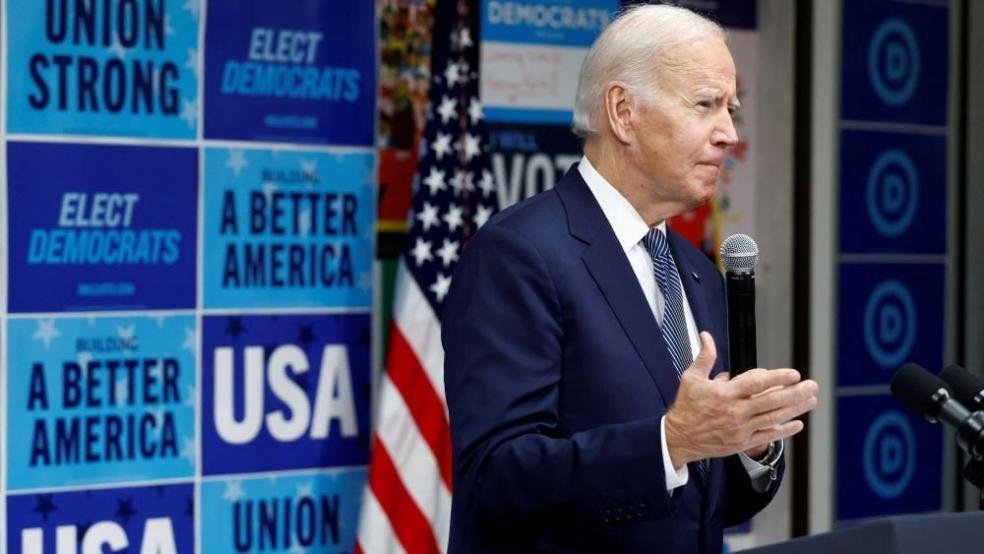President Joe Biden on Monday delivered what he called his “closing argument” to voters ahead of the midterm elections, which he said offered “a choice between two vastly different visions for America.”
Speaking to staffers at the Democratic National Committee headquarters in Washington, Biden declared that Democrats were focused on “building a better America for everyone with the economy that grows from the bottom up in the middle out where everyone does well.” Republicans, by contrast, want to impose “mega trickle-down economics that benefits the very wealthy,” Biden said, while targeting popular benefits programs for cuts and putting the economy at risk by playing political games with the debt ceiling.
“Republicans have made it clear that if they win control of the Congress, they will shut down the government, refuse to pay our bills, and it will be the first time in our history America will default unless I yield and cut Social Security and Medicare,” Biden said. “They’re flat-out saying that, in order to cut Social Security, Medicare, they’re threatening to default on the federal debt. There’s nothing, nothing that would create more chaos, more inflation and more damage to the American economy than this. … Republicans are going to crash the economy” if they get their way, he added.
Who’s the responsible one? Biden argued that Democrats are the more responsible party when it comes to the federal budget. “We the Democrats are the ones that are fiscally responsible. Let's get that straight now,” he said. “And we're investing in all of America, reducing everyday costs while also lowering the deficit.” By contrast, “Republicans are fiscally reckless pushing tax cuts for the very wealthy that aren't paid for,” Biden charged, referring to reports that GOP lawmakers plan to push for an extension of the 2017 Trump tax cuts.
The president also pushed back against the way his opponents portray his party. “Republicans love calling Democrats big spenders and claim that they are for less government spending,” he said. “Well, give me a little break here, just look at the facts. The federal deficit went up every single solitary year in the Trump administration, went up every year, and went up before the pandemic and went up during the pandemic and went up every single year on his watch. And one big reason for that is that they voted for a $2 trillion Trump tax cut which overwhelmingly benefited the biggest corporations and the wealthiest Americans, and it racked up significant debt and not a penny was paid for.”
The president highlighted the reduction in the budget deficit under his administration in 2022 – the largest one-year drop in U.S. history, driven almost entirely by the expiration of Covid-related relief spending. “The deficit fell by $1.4 trillion dollars this year, cut the deficit in half,” he said. “And that follows a drop last year of $350 billion. And by the way, because we're finally ensuring corporations began to pay their fair share, [and] we're giving Medicare the power to negotiate drug prices, we’re going to reduce the deficit over the next 10 years by another $250 billion.”
Fiscal battles ahead: Confident they will win control of at least the House, some GOP lawmakers are planning their approach to fiscal issues – an approach that could involve attempts to cut federal spending, using the debt ceiling as leverage.
House Republican Leader Kevin McCarthy (R-CA) last week pushed back against the idea that Republicans wanted to use the expected negotiations over raising the debt ceiling next year to cut Social Security and Medicare, but other Republicans in the House have been speaking about doing just that.
Rep. Chip Roy (R-TX), a member of both the Freedom Caucus and the Republican Study Committee, told Politico that he wants to use whatever opportunity Republicans have to fight for spending cuts. “You have two simple leverage points: when government funding comes up and when the debt ceiling is debated,” Roy said. “And the only question that matters is, will leadership use that leverage?”
Rep. Jason Smith (R-MO), the ranking member on the House Budget Committee, has also said that he wants to use debt ceiling negotiations to push for spending cuts. “On multiple occasions over the past decades, an increase in the debt limit has been accompanied by reforms to curtail and cut Washington spending and impose fiscal restraints on Congress,” he said in a statement.
Still, there will likely be numerous hurdles for these Republican lawmakers to clear before they can test whatever leverage they might have. Some more centrist Republicans may agree to work with Democrats to pass a 2023 budget bill in December, pushing the next funding battle well into next year. Similarly, the debt ceiling may not need attention until the second half of 2023. And even if the most radical fiscal hawks in the House Republican caucus can push through a deal that involves spending cuts, Biden has sworn to veto it.
In the meantime, the focus on cutting spending and rattling sabers over the need to raise the debt ceiling are giving Democrats what appears to be a major theme of their final pitch to voters with just two weeks to go until the midterms. “The Republicans have said that if they win, they want to subject Medicare, Social Security — health blackmail — to lifting the debt ceiling,” House Speaker Nancy Pelosi (D-CA) told CBS’s “Face the Nation” last weekend. “They have said they would like to review Medicare and Social Security every five years. They have said that they would like to make it a discretionary spending that Congress could decide to do it or not, rather than mandatory. So Social Security and Medicare are on the line.”




